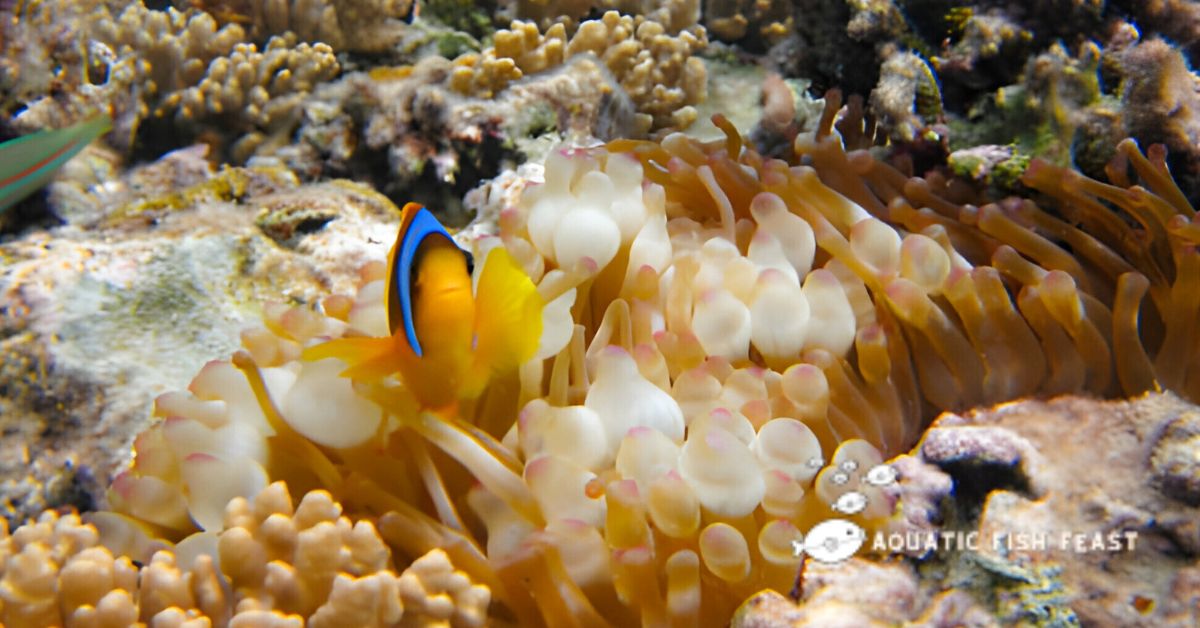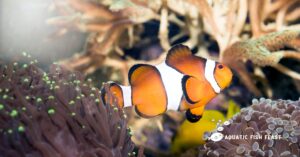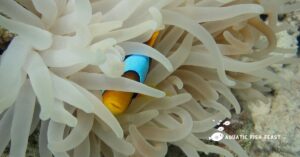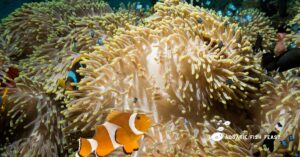Do you want to know how often clownfish eat? Yes, I want to know how often clownfish eat. Clownfish require more upkeep than the ordinary freshwater aquarium, as I do for my clownfish regularly.
Their nutritional needs are more complex; thus, they require a range of foods in their daily diet.
However, like with any fish, you must exercise caution and avoid overfeeding them. Clownfish enjoy taking up space.
If you have more than one clownfish, you need a large tank to allow them to wander freely. Clownfish, on the other hand, are one of the simplest saltwater fish to care for.
Because of their durability and low care requirements, they are great for those new to saltwater aquariums.
If you have a clownfish or are considering obtaining one and want to know how frequently you should feed it, keep reading to find out what you can feed them and how often you should feed them.
Now, let’s get started.
Table of Contents
How Often To Feed Clown Fish To Keep Them Healthy
Clownfish demand more care than the typical freshwater fish aquarium, including the daily care I do for my clownfish.
Their nutritional needs are more varied, so the foods they consume daily need to be diversified to meet all of their nutritional requirements.
On the other hand, you can’t allow yourself to get carried away and overfeed them as you would any other kind of fish. Clownfish, like most fish, want to occupy a lot of area.
If you intend to have more than one clownfish in your aquarium, you will need a large tank to provide them with sufficient room to swim freely. On the other hand, clownfish are one of the saltwater species requiring the most minor maintenance.
Because of their hardiness and relatively minimal care needs, they are an excellent choice for individuals just starting with saltwater aquariums.
Continue reading to find out what you can feed your little friends and how often you should feed them to find out what you can feed your little friends and how often you should feed them if you have just gotten a clownfish or are considering obtaining one and want to know how frequently you will have to feed it.
How Long Can Clownfish Go Without Eating
They can easily spend a week without eating anything. Two weeks wouldn’t be unusual either. Despite this fact, it’s not advisable to have children hungry for so long when you can make adjustments to have them eat.
For example, you can ask your neighbor to take care of their feeding. But an unskilled neighbor would more likely cause a problem with this. Two, a couple of tiny feeds would fulfill the function perfectly for a week or two.
If this is not possible, you can go for auto-feeding. Auto-feeders fitted at the aquarium top contain reserve meals like flakes and pellets.
They drop a certain amount of food at specific periods, making sure your clowns are not food-deprived while you are gone.
Coming back to the bear-ability, the wild-caught individuals are significantly more hardy than captive-bred kinds.
The wild species can even go one month and would still flourish. The best would still be making some arrangements for their food while you enjoy your days out.
Is It OK To Feed Clownfish Every Other Day
The short answer is yes. The Clowns like their food and should do it at least once daily to keep their bodies in good condition.
Two to three light feedings daily are recommended for breeding and maintaining optimum health in your pet.
They can spend a week without eating if they are healthy and properly nourished, but this is not something that happens consistently every week of the year.
In addition, you should divide the food into several portions and feed it to your clownfish at various times during the day. This will keep them happier.
Some owners of clownfish choose to break up the feeding process into five or six stages and provide the fish with small amounts of food at regular intervals.
While that is OK, dividing it into two or three portions might work better.
This shouldn’t be a significant concern.
If you are going to be gone for the day and are concerned about your fish’s diet, you need just put the food for the day into the tank in the morning before you leave.
What Can A Clownfish Eat
Clownfish are not discriminating eaters; they will consume practically any type of fish food. You won’t have any trouble feeding your clownfish because they can consume flakes, which is not a typical attribute in saltwater fish.
However, because they are predatory fish, you must ensure they obtain enough nutrients from their food.
On regular days, feed your clownfish conventional fish food and mix it with different sorts.
Adding variation to your fish’s food will ensure it receives nutrients.
You may occasionally give it brine and live food, such as krill, Mysis, or prawns.
You may also acquire frozen live food to make feeding your fish easier.
Clownfish enjoy vegetables, so include some in their diet, such as spinach or nori.
Both spinach and nori may be found at your local grocery shop.
If this sounds like a lot of nutritional variety to keep up with, feed your clownfish regular pellets or flakes and veggies or live food twice a week.
How much should you feed your clownfish now that you know what it can eat?
If you’ve ever had fish or have friends who maintain it, you’ve probably heard about how easy it is to overfeed it.
What’s The Clown Fish Feeding Routine
The feeding schedule for your Nemo will be determined by the portions you provide and their age. Smaller clownfish often require more food than larger ones.
A modest meal 3-4 times should be enough for a young clownfish. Adult fish, on the other hand, can survive on only two feedings every day.
The routine is not required, and it can be reduced to once every day for adults and 2-3 times per day for children. However, it is not always an intelligent idea and may impact the development of your small companions.
When it comes to the servings, they may be tailored to your specific fish. For adults fed once a day or adolescents fed 2-3 times a day, you might consider a somewhat more significant portion. But, once again, too much food might harm their health.
As a result, you must take care not to drop too much food. The simplest way to handle this is to feed them by minute count.
Place food in the tank and allow your friend to feed for 2-3 minutes. They could eat enough food by the end of the day. If you feed them once, you can extend the restriction to 3-5 minutes.
How To Feed Your Clownfish
There is no one-size-fits-all solution for feeding your clownfish. However, you can do a few things to guarantee your fish gets the nutrition it needs.
One approach is to give your clownfish authentic seafood daily. Shrimp, fish and crayfish are examples of this.
It is advisable to thoroughly cleanse the food before administering it to your fish, as clownfish have been observed to ingest parasites and other potentially harmful organisms.
Another possibility is to build up a feeding station with floating food and live plants. This will supply your clownfish with a variety of feeds while also keeping the tank clean. Whatever you do, carefully check your clownfish’s health and change the feeding plan as necessary.
Feeding your clownfish might initially seem frightening, but it becomes second nature with some planning and patience. Here are a few pointers to get you started:
To begin, combine all food components in one container before placing them in the tank. This will facilitate the maintenance of cleanliness and organization.
During feeding periods, provide food as frequently as possible; once every two hours is typically plenty.
Be patient; certain clownfish may require more time to acclimatize to new food sources.
What Are The Problems With Overfeeding Clownfish
Have you ever noticed that clownfish will continue to eat until you remove the food you provided them? You got that correctly!
These voracious eaters will keep consuming food for as long as you offer it and won’t feel guilty about it.
But even if they don’t, it may cause you to second-guess your choice to give them excessive amounts of food.
You should also know that you are not alone in this. This is a standard error made by owners of clownfish, unaware that overfeeding can lead to serious health problems for their pets.
A large amount of food waste will not only make the fish sick but also begin to make the environment in your aquarium hazardous.
And that will result in the fish having even more health problems in the future. Let’s assume it is safe to maintain a consistent feeding plan for the clownfish and to refrain from overfeeding them.
Final Thought
Now that we have established how often clownfish eat, also know that Feeding clownfish might be perplexing at first.
Nevertheless, when one dedicates more time to observation, a deeper comprehension of the feeding habits of clownfish may be attained.




